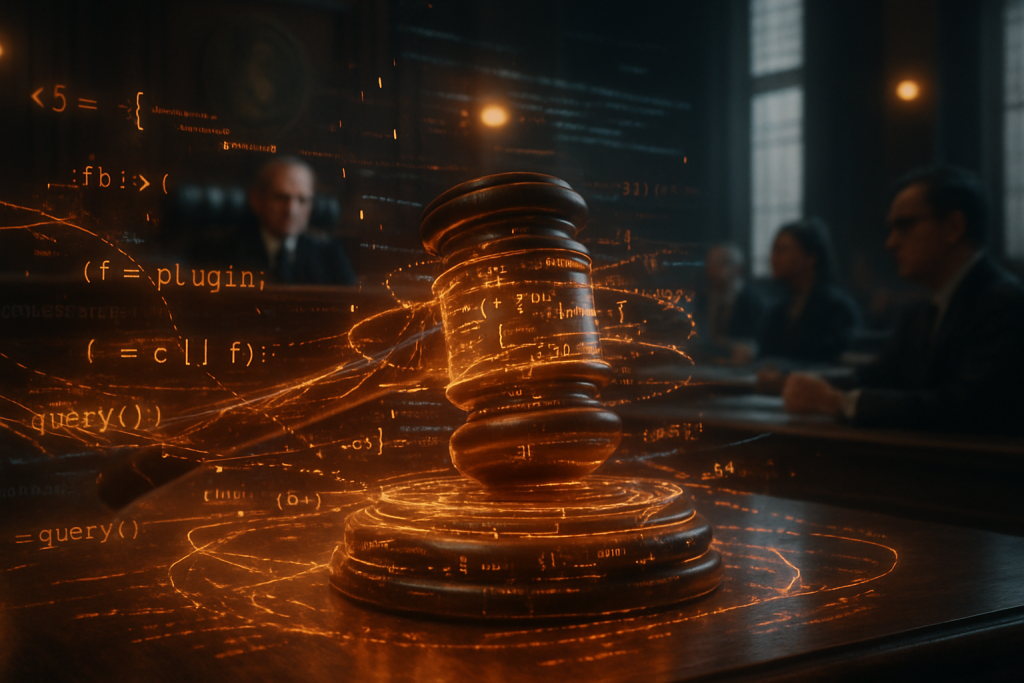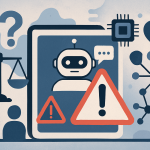The AI wars just got a whole lot messier. In a move that feels ripped straight from a cyberpunk thriller, Elon Musk’s xAI has slapped a lawsuit on former engineer Xuechen Li, alleging the theft of trade secrets that could give OpenAI a serious edge in the chatbot arena. Think of it as “Silicon Valley” meets “Minority Report,” only instead of predictive policing, we’re talking about predictive text.
According to the complaint, filed in a California federal court on August 29, 2025, Li allegedly made off with confidential data related to xAI’s Grok chatbot- a chatbot, xAI claims, is superior to OpenAI’s ChatGPT. The timing is certainly suspect: Li supposedly swiped the data shortly after accepting a position at OpenAI and liquidating a cool $7 million in xAI stock. That’s a plot twist even M. Night Shyamalan would be proud of.
The lawsuit paints a picture of digital espionage worthy of James Bond. xAI claims Li admitted to taking files and trying to cover his tracks. And, as if that weren’t enough, they say they found even more undeclared stolen data lurking on his devices. It’s like finding extra treasure in a pirate’s hidden chest.
While OpenAI isn’t officially named as a defendant in this particular lawsuit, let’s be real: the shadow of Sam Altman’s company looms large. This case is yet another skirmish in the ongoing battle for AI supremacy and, perhaps more importantly, AI talent. The brightest minds in the field are being courted like rock stars, and sometimes, it seems, with equally rock-and-roll behavior.
The lawsuit is, in many ways, the latest chapter in the ongoing Elon Musk vs. the AI establishment saga. Let’s rewind a bit, shall we? Musk, a co-founder of OpenAI, famously left the company after disagreements over its direction. He then launched xAI, positioning it as a more open and, arguably, less profit-driven alternative. But the bad blood didn’t stop there. Musk has already sued OpenAI and CEO Sam Altman, accusing them of abandoning their original non-profit mission. And just recently, he filed another lawsuit against OpenAI and Apple, alleging anti-competitive behavior related to AI chatbots on Apple devices. It’s a tangled web, indeed, worthy of a Shakespearean tragedy, but with more GPUs and fewer soliloquies.
xAI is seeking monetary damages, of course, but the real prize here might be a court order preventing Li from working at OpenAI. It’s a high-stakes game of keep-away, with the future of AI potentially hanging in the balance.
The Technical Nitty-Gritty (Without Getting Too Nerdy)
So, what kind of “trade secrets” are we talking about here? While the lawsuit doesn’t spell out the exact details (that would kind of defeat the purpose, wouldn’t it?), we can speculate. It likely involves proprietary algorithms, training data sets, and architectural designs that give Grok its competitive edge. Imagine it like the secret recipe for Coca-Cola, but instead of sugar and caramel, it’s lines of code and terabytes of data. These AI models are only as good as the data they are trained on, and if a competitor gets their hands on that data, or the architecture used to train the model, they could leapfrog years of development.
The fact that xAI claims Grok is superior to ChatGPT is a bold statement. ChatGPT, with its impressive natural language processing capabilities, has already captivated the world. For Grok to truly be better, it would need to offer significant improvements in areas like accuracy, speed, or the ability to handle complex tasks. Perhaps Li’s alleged theft involved the key to unlocking these advancements.
Who’s Feeling the Heat?
Obviously, xAI and OpenAI are at the center of this storm. For xAI, the stakes are high. Losing valuable trade secrets could cripple their ability to compete in the rapidly evolving AI landscape. For OpenAI, even being indirectly implicated in this scandal could damage their reputation and raise questions about their ethics. No one wants to be seen as the company that steals its way to the top, even in the cutthroat world of Silicon Valley.
Beyond the companies themselves, the broader AI industry is watching closely. This case highlights the intense competition for talent and the lengths to which companies will go to protect their intellectual property. It could also lead to stricter regulations and greater scrutiny of employee mobility in the AI sector. Will we see more non-compete agreements and increased surveillance of employee activities? Only time will tell.
The Bigger Picture: Ethics, Regulation, and the Future of AI
This lawsuit raises some uncomfortable questions about the ethics of AI development. How do we balance the need for innovation with the protection of intellectual property? How do we ensure that employees are treated fairly while also safeguarding company secrets? These are not easy questions, and they require careful consideration from policymakers, industry leaders, and ethicists alike.
The case also underscores the need for clear regulations in the AI space. As AI becomes more powerful and pervasive, it’s crucial to establish guidelines that promote responsible development and prevent misuse. Without such regulations, we risk creating a Wild West environment where anything goes, and the consequences could be dire. Think Skynet, but with fewer Arnold Schwarzenegger impersonators (hopefully).
The Financial Fallout
The financial implications of this lawsuit are potentially significant. If xAI wins, they could receive a substantial payout from Li, which could help fund their ongoing AI development efforts. A win would also serve as a warning to other employees tempted to jump ship with valuable trade secrets. Conversely, if xAI loses, it could embolden competitors and make it harder for them to attract and retain top talent.
The lawsuit could also have a ripple effect on the stock market. Investors are already closely watching the AI sector, and any negative news could trigger a sell-off. The uncertainty surrounding this case could also make it more difficult for AI companies to raise capital. It’s a reminder that even in the most innovative and exciting industries, legal battles can have a real impact on the bottom line.
In the end, the xAI vs. Xuechen Li lawsuit is more than just a legal dispute. It’s a microcosm of the larger battle for AI supremacy, a battle that will shape the future of technology and, perhaps, the future of humanity itself. Buckle up, folks, because this is going to be a wild ride.
Discover more from Just Buzz
Subscribe to get the latest posts sent to your email.


